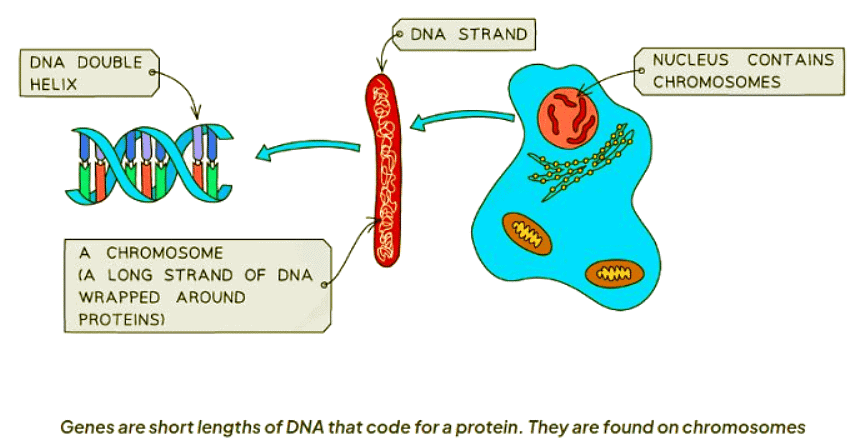Year 11 Exam > Year 11 Notes > Biology for GCSE/IGCSE > Chromosomes, Genes & Proteins
Chromosomes, Genes & Proteins | Biology for GCSE/IGCSE - Year 11 PDF Download
The Structure of Genes
Inheritance of Chromosomes, Genes and DNA
- Inheritance is the passing of genetic information from one generation to the next.
- Chromosomes are found in the nucleus of cells.
- They are thread-like structures made of DNA, carrying genetic information in the form of genes.
- A gene is a short segment of DNA on a chromosome that codes for a specific protein.
- This protein could be a structural protein like collagen in skin cells, an enzyme, or a hormone.
- Genes determine our characteristics by coding for proteins that have key roles in cellular functions.
- Imagine zooming into the nucleus of a cell, as depicted in the diagram:
- On the right, you see the zoomed-out view,
- Progressively zooming in as you move across the diagram from right to left.

Alleles: The Genetic Variants
- Alleles are distinct gene versions influencing individual characteristics.
- The ABO blood group gene showcases three alleles - IA, IB, and IO.
- These variants collectively shape the traits of all living organisms.
Question for Chromosomes, Genes & ProteinsTry yourself: What are chromosomes?View Solution
The document Chromosomes, Genes & Proteins | Biology for GCSE/IGCSE - Year 11 is a part of the Year 11 Course Biology for GCSE/IGCSE.
All you need of Year 11 at this link: Year 11
|
110 videos|158 docs|34 tests
|
FAQs on Chromosomes, Genes & Proteins - Biology for GCSE/IGCSE - Year 11
| 1. What is the relationship between genes, chromosomes, and proteins? |  |
Ans. Genes are segments of DNA that contain instructions for making proteins. These genes are located on chromosomes, which are long strands of DNA. Proteins are molecules that carry out various functions in the body based on the instructions provided by genes.
| 2. How many chromosomes do humans have and how do they relate to genes? |  |
Ans. Humans have 46 chromosomes, with 23 inherited from each parent. These chromosomes contain thousands of genes that provide the instructions for making proteins essential for various bodily functions.
| 3. How are genes structured within chromosomes? |  |
Ans. Genes are made up of specific sequences of DNA that are organized into units called exons and introns. Exons contain the coding regions that determine the sequence of amino acids in a protein, while introns are non-coding regions that are removed during the process of protein synthesis.
| 4. How do mutations in genes affect protein production? |  |
Ans. Mutations in genes can alter the sequence of DNA, leading to changes in the structure of proteins produced. These changes can affect the function of proteins, potentially leading to genetic disorders or diseases.
| 5. How does the process of transcription and translation relate to gene expression and protein synthesis? |  |
Ans. Transcription is the process of copying the DNA sequence of a gene into a molecule of messenger RNA (mRNA), while translation is the process of converting the mRNA sequence into a specific protein. Together, these processes control gene expression and protein synthesis in the body.

|
Explore Courses for Year 11 exam
|

|
Signup for Free!
Signup to see your scores go up within 7 days! Learn & Practice with 1000+ FREE Notes, Videos & Tests.
Related Searches

















